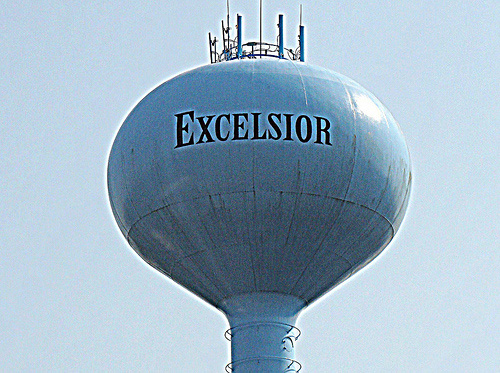Excelsior MN Water Hardness & Water Quality Guide

Occasional Rusty, Discolored Water
The City of Excelsior has a water treatment plant that is designed to reduce Water Hardness, Iron, and Manganese. The system uses specialized Filter Media that attracts the minerals as water passes through the sand filters.
Not all Iron and Manganese are removed from the water. Overtime, Iron and Manganese levels can build up. Heavy sprinkling, water main breaks, and hydrant flushing can break that build up loose. This results in discolored water leaves orange/red/brown stains. They can also result in taste or odor complaints.
Arsenic in the Excelsior MN Area
Water provided by the City of Excelsior does not contain excessive Arsenic. Private wells in the area may be at risk. High levels of Arsenic have been found in private wells throughout Excelsior, Greenwood, and Shorewood.
If you have a private well, the Department of Health recommends annual testing for Arsenic, Coliform Bacteria, Nitrates, and Lead.
- Soft Water
- Excelsior Water Hardness
Excelsior Water Softener Recommendations
The national average for water hardness is 5gpg (grains per gallon). Excelsior water hardness is 6-7gpg, which is slightly higher than average.
A water softener will protect your water heater, plumbing, and appliances from hard water damage. A high efficiency water softener will offer the same protection, but will use far less water and salt.
Need the Right Water Softener or Filter for Your Home in Excelsior, MN?
Contact us for a FREE water test and site inspection. We’ll get you a FREE quote to help you get the water quality you want.
Excelsior Water Reports
The City of Excelsior, MN does regular water testing and publishes the results in Annual Drinking Water Reports. These reports explain which water contaminants, and what levels have been found.
MCL: Maximum Contaminant Level
The legal limit for a certain contaminant
MCLG: Maximum Contaminant Level GOAL
The level with ZERO HEALTH RISKS, aka the “Health Limit”
All water contaminants meet the EPA’s “Legal Limit”. Contaminants that exceed the EPA’s Health Limit have been highlighted below.
Inorganic Contaminants
Inorganic contaminants include natural and manmade salts and metals. You are mostly exposed to inorganics through drinking water, most do not easily pass through skin. Carbon Filters (refrigerator and faucet filters) have almost ZERO impact on these contaminants. Reverse Osmosis very effective at removing inorganic contaminants.
| Contaminant | Amount Found | Health Limit | Legal Limit | Potential Effects |
|---|---|---|---|---|
| Barium | 0.06 | 2 | 2 | Increase in blood pressure |
| Fluoride | 0.8-1.6 | 4 | 4 | Bone disease;children may get mottled teeth |
| Nitrate | 0.06 | 10 | 10 | Blue-baby syndrome |
Organic Contaminants
Organic contaminants can come from either natural sources like algae, or man-made chemicals. You can be exposed through drinking water, absorption through skin (bathing), and inhalation. This makes a Hybrid Filter System, or Whole House Carbon Filter a good preventative tool.
| Contaminant | Amount Found | Health Limit | Legal Limit | Potential Effects |
|---|---|---|---|---|
| Xylenes | 0.03 | 1.8 | 100 | Nervous system damage |
Disinfectants and Disinfection Byproducts
Disinfectants are added to kill bacteria. Disinfectants like Chlorine react with other chemicals and create “Disinfection Byproducts. These chemicals enter the body through inhalation, absorption through skin, and drinking water. A Whole House Carbon Filter is a good preventative tool in addition to a Drinking Water System for these compounds.
| Contaminant | Amount Found | Health Limit | Legal Limit | Potential Effects |
|---|---|---|---|---|
| Chlorine | 0.42-1.1 | 4 | 4 | Eye/nose irritation; stomach discomfort |
| Chloroform | 9.38-15 | 5.7 | 80 | Nervous system depression, increase in kidney and liver tumors |
| Haloacetic Acids | 0.9-2.6 | 0 | 80 | Increased risk of cancer |
| Total Trihalomethanes | 7.4-22.8 | 0 | 60 | Increased risk of cancer |
